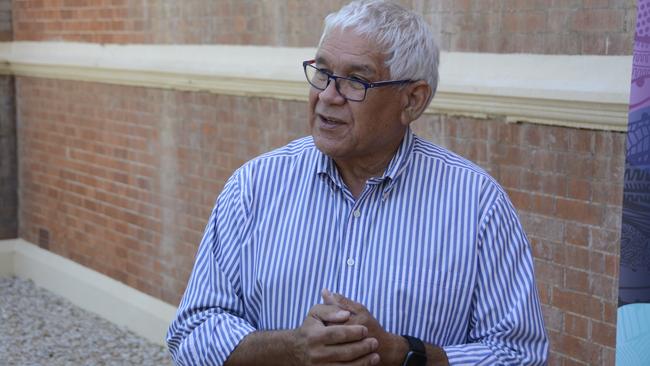Fears for indigenous treaty if LNP wins election
Aboriginal leader Mick Gooda says an LNP win would jeoporadise QLD’s treaty negotiations with the indigenous people.

Aboriginal leader Mick Gooda says there’s a “big concern” Queensland’s move to negotiate a treaty with the state’s indigenous people would be in jeopardy if the LNP wins next October’s state election.
Deputy Premier Jackie Trad opened the door to financial reparations for Queensland’s Aboriginal and Torres Strait Islanders in July, after promising to negotiate a treaty or treaties.
Mr Gooda, the former Aboriginal and Torres Strait Islander social justice commissioner, is part of the eminent panel appointed to lead extensive consultations on the path to treaty and advise the government on the shape of a future agreement.
The panel has consulted with more than 1000 people across Queensland, from Birdsville in the far southwest to Thursday Island at the northern tip of the state, over the past couple of weeks.
Mr Gooda said the need for redress — possibly in the form of a South African-style post-apartheid truth and reconciliation commission — was “fundamental” to reconciliation, but not necessarily compensation.
“(Financial reparation) was mentioned every now and then but it wasn’t an overwhelming view put to us,” he said. “People talked about redress generally, but different forms of redress, not just money. The view was you can’t have a treaty unless it’s based on the truth. So there would have to be a truth-telling process somewhere.
“I don’t think I’d find an Aboriginal or Torres Strait Islander person in Queensland who thinks we’ve confronted the truth yet of the past. Whether it’s the way the state, or the nation, was settled, or the ongoing treatment of our mob in Queensland, whether it’s through the killings, the reprisals, or the money taken out (stolen wages), like my mum, or my grandparents, when they were mission workers.
“We think that needs to be out there with Queenslanders more generally. Once we settle on that basic truth, white fellas can move on and black fellas can move on.”
He said the panel was likely to recommend that the outcomes of the truth-telling form an “essential part of the school curriculum from then on”.
Mr Gooda said the eminent panel, which is co-chaired by historian and indigenous activist Jackie Huggins and former attorney-general Michael Lavarch, was also likely to recommend multiple treaties, because it was more practical and representative than a single treaty. He said there would not be a treaty negotiated within 12 months, but he hoped the Palaszczuk government would introduce legislation to confirm a “path to treaty” before next October’s state election.
He said there was real concern the LNP opposition would not continue with the treaty process if it won the election.
“There’s a big concern, because that’s what happened to South Australia. The Labor government had started the treaty process there and had got to the point of appointing a treaty commissioner, but then there was a change of government and the new government decided not to go ahead with that,” Mr Gooda said. The LNP on Sunday indicated it would not continue with the treaty process if elected.
“This is Labor’s policy and they need to implement it,” an LNP spokesman said.
“The LNP supports practical policies to close the gap on indigenous disadvantage.”
Victoria started a treaty process in 2016, and indigenous Victorians have voted for members of the First Peoples’ Assembly of Victoria — a body to advise the government on the process.
The Northern Territory Labor government also started a treaty process last August and is preparing for multiple treaties.
The former West Australian Liberal government negotiated a $1.3bn land deal with the Noongar people of the southwest, described as “Australia’s first treaty” by Harry Hobbs and George Williams of the Faculty of Law at the University of NSW.



